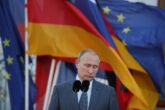October 03, 2024
Exploiting Russian Weakness
Leaning in to Support the Pro-Western Orientation of Moldova and Georgia
Introduction
Russia’s full-scale invasion of Ukraine has created ripple effects that extend well beyond Ukraine’s borders. Reverberations from the war have been particularly profound in former Soviet countries situated between Russia and the West, where Moscow has increased its efforts to revise the regional order—one the Kremlin would like to see built on compliant and nondemocratic states along Russia’s periphery. Russia’s efforts have elicited differing responses in these neighboring countries, triggering a series of geopolitical realignments that have the potential to reshape the geopolitical orientation of the region and that raise the risk of further instability along NATO’s boundary.
These realignments in Russia’s so-called near abroad are far from uniform—while some “in-between” states have moved closer to Russia since the invasion, others have sought to deepen ties with the West, in large part given heightened concerns about rising Russian aggression. Georgia and Moldova, respectively, illustrate this two-directional trend in the region. As Tbilisi has gravitated toward the Kremlin, Chisinau has enthusiastically pursued deeper integration with the European Union (EU) as an alternative to dependence on Russia.
Though highly significant, the ongoing geopolitical reorientations in Moldova and Georgia are not final; both countries face key elections in October 2024 with the potential to either harden or reverse their current trajectories. (Moldova also has a significant parliamentary election in 2025.) Recognizing these implications, Russia has already acted to sway both countries’ elections and, depending on the outcome, could still take more drastic actions to shore up its influence in Moldova and Georgia, raising the risk of instability. The highly personalized nature of the Putin regime further increases the prospect of more unpredictable action from the Kremlin as it pursues greater Russian control over the region.
While the war in Ukraine continues, the transatlantic partners have an opportunity borne out of this crisis to rid the region of Russia’s corrosive influence and more firmly anchor Moldova and Georgia in the good governance, democracy, and economic prosperity that are cornerstones of the Euro-Atlantic space.
Yet this moment also presents an opportunity for the United States and EU. Russia is bogged down and preoccupied with its war in Ukraine, and as a result the Kremlin has less capacity and fewer resources available to advance its other aims. While the war in Ukraine continues, the transatlantic partners have an opportunity borne out of this crisis to rid the region of Russia’s corrosive influence and more firmly anchor Moldova and Georgia in the good governance, democracy, and economic prosperity that are cornerstones of the Euro-Atlantic space.
To this end, this paper assesses Russia’s geopolitical aims and actions in Moldova and Georgia, identifies shared transatlantic interests in supporting these countries, and provides recommendations for actions the United States and Europe can take to enhance their support.
About the Authors
Nicholas Lokker is a research associate for the Transatlantic Security Program at the Center for a New American Security (CNAS). His work explores the development of the political and security order in Europe, focusing on the integration and enlargement of the European Union as well as the evolving roles of Russia and the United States in the region.
Dr. Andrea Kendall-Taylor is a senior fellow and director of the Transatlantic Security Program at the Center for a New American Security. She previously served as deputy national intelligence officer for Russia and Eurasia at the National Intelligence Council and as a senior intelligence officer at the Central Intelligence Agency.
About the Transatlantic Forum on Russia
This policy brief is a product of the CNAS Transatlantic Forum on Russia, an initiative designed to spur coordination between the United States and Europe on Russia-related policy across multiple issue areas. Policy briefs are informed by a series of dialogues with leading experts from both sides of the Atlantic.
Acknowledgments
The authors thank all of those who contributed to the fruitful exchange of ideas that led to this policy brief, especially Denis Cenusa, Tom de Waal, Laura Thornton, Stefan Meister, and Jim Townsend. The authors are also grateful to Leighton Symons and Anna Avanesyan for their research assistance. This report was made possible with the generous support of the Norwegian Ministry of Defense.
As a research and policy institution committed to the highest standards of organizational, intellectual, and personal integrity, CNAS maintains strict intellectual independence and sole editorial direction and control over its ideas, projects, publications, events, and other research activities. CNAS does not take institutional positions on policy issues, and the content of CNAS publications reflects the views of their authors alone. In keeping with its mission and values, CNAS does not engage in lobbying activity and complies fully with all applicable federal, state, and local laws. CNAS will not engage in any representational activities or advocacy on behalf of any entities or interests and, to the extent that the Center accepts funding from non-U.S. sources, its activities will be limited to bona fide scholastic, academic, and research-related activities, consistent with applicable federal law. The Center publicly acknowledges on its website annually all donors who contribute.
Read the full report
More from CNAS
-
Identifying Russian Vulnerabilities and How to Leverage Them
Getting U.S. policy toward Russia right requires an understanding of Russia’s vulnerabilities and how to leverage them....
By Andrea Kendall-Taylor, Richard Connolly, Siemon Wezeman, Gavin Wilde, Elina Ribakova, Benjamin Hilgenstock, Edward Fishman, Eric Ciaramella, Paul Stronski, Peter Schroeder, Timothy Frye & Maria Snegovaya
-
Charting a Transatlantic Approach to Russia
Although the United States and Europe are not directly engaged in the war with Russia in Ukraine, Moscow clearly sees itself as being at war with the West. The United States a...
By Andrea Kendall-Taylor
-
How Finnish and Swedish NATO Accession Could Shape the Future Russian Threat
About the Transatlantic Forum on Russia This policy brief is a product of the CNAS Transatlantic Forum on Russia, an initiative designed to spur coordination between the Unite...
By Nicholas Lokker, Jim Townsend, Heli Hautala & Andrea Kendall-Taylor
-
Transatlantic Security / Securing U.S. Democracy Initiative
Respect Umpires — on the Field and in the CourtroomCongress shouldn’t let the administration’s contempt slide. None of us should....
By Will Rogers






